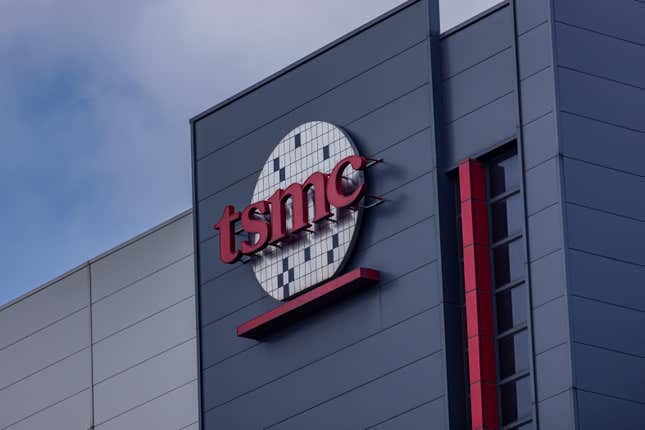
Another major chipmaker is getting a share of the U.S. funding meant to bring advanced chipmaking to American soil.
Taiwan Semiconductor Manufacturing Company will get $6.6 billion in grants through the federal CHIPS and Science Act, as well as up to $5 billion in loans to support its first major U.S. chipmaking hub in Phoenix, the Biden administration said Monday. TSMC already has two chipmaking facilities in Arizona expected to begin production in 2025 and 2028, and will use some of the new funding to build a third facility, increasing the company’s investment from $40 million to $65 million, according to the Biden administration. The new facility will also create more than 25,000 jobs in construction and manufacturing, as well as indirect jobs.
“TSMC’s renewed commitment to the United States, and its investment in Arizona represent a broader story for semiconductor manufacturing that’s made in America and with the strong support of America’s leading technology firms to build the products we rely on every day,” President Joe Biden said in a statement.
TSMC’s planned chipmaking hub in Phoenix will put the U.S. on track to produce 20% of the world’s advanced chips by 2030, the Biden administration said. Although semiconductors were invented in the U.S., the country produces less than 10% of chips in the world today — none of which are among the most advanced ones made by TSMC abroad.
“For the first time ever, we will be making at scale the most advanced semiconductor chips on the planet here in the United States of America, by the way, with American workers,” Commerce Secretary Gina Raimondo said in remarks reported by Bloomberg.
In March, Intel received $8.5 billion in direct government funding from the CHIPS Act, supporting its plans to invest over $100 billion in expanding chipmaking in the U.S. over the next five years.
The company’s first fabrication site (fab) is expected to begin production of 4-nanometer chips in the first half of 2025, while the second fab will focus on producing 2-nanometer process technology in addition to 3-nanometer technology starting in 2028, it said. In January, TSMC announced delays at both planned facilities, citing a shortage of skilled workers. The third fab will then focus on producing chips with 2-nm or more advanced technology by the end of the decade, TSMC said. The next-generation 2-nm chips are essential for developing AI and military technology, according to Raimondo.
“The CHIPS and Science Act provides TSMC the opportunity to make this unprecedented investment and to offer our foundry service of the most advanced manufacturing technologies in the United States,” TSMC chairman Mark Liu said in a statement. “Our U.S. operations allow us to better support our U.S. customers, which include several of the world’s leading technology companies. Our U.S. operations will also expand our capability to trailblaze future advancements in semiconductor technology.”
TSMC makes an estimated 90% of the world’s advanced chips, and counts chipmaking leader Nvidia and iPhone-maker Apple as its top partners. Nvidia, which unveiled its highly-anticipated new Blackwell chip in March, said it is “excited to continue” its partnership with the chipmaker in Arizona.
“TSMC has been a long-standing partner of NVIDIA since we invented the GPU and accelerated computing, and our ongoing innovation in Artificial Intelligence (AI) would not have been possible without them,” Nvidia CEO Jensen Huang said in the same statement.
Neither TSMC nor the Department of Commerce immediately responded to a request for comment.
The CHIPS Act includes $39 billion in manufacturing incentives, and other awardees so far include GlobalFoundries, Microchip Technology, and BAE Systems.
More chips news
South Korea sends chipmaking equipment to China — and the U.S. wants it to stop
Samsung is reportedly investing $44 billion in a Texas semiconductor hub, a boost to U.S. chipmaking